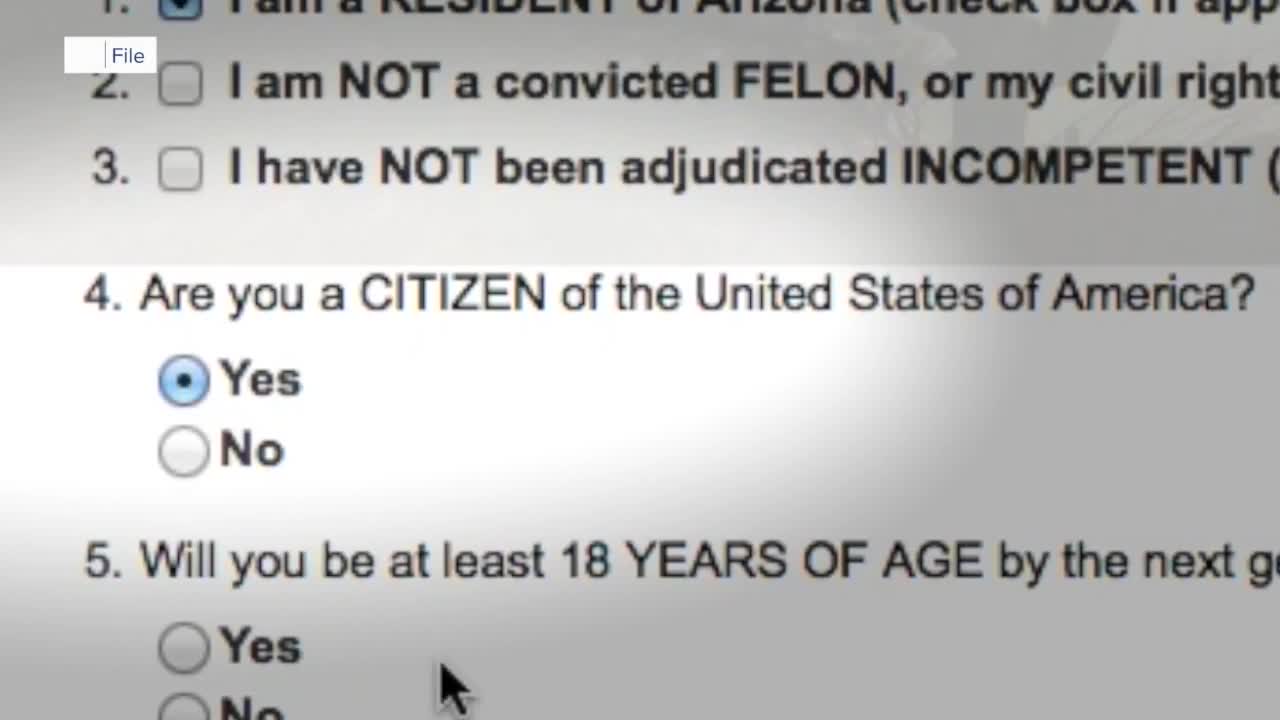PHOENIX — Arizona voters affected by data coding errors in the Motor Vehicle Division could still see changes to their registration, despite a recent opinion from the state attorney general.
About 218,000 voters – including 83,000 in Maricopa County – may not have provided proof of U.S. citizenship due to systemic database issues stretching back 20 years but have been casting full ballots.
Counties are reaching out to the affected voters to ask for citizenship proof. But what happens to those voters varies by county, raising legal concerns.
For example, Maricopa County sent letters in June telling voters their registrations will be changed to “federal only” unless they submit documents within 90 days. Federal-only voters cannot vote in Arizona’s state or local elections.
But the Pima County Recorder’s Office described the letters it sent to voters there as a “precaution.” Those notices don’t have a deadline, and the office told ABC15 it is not changing voters’registration status.
Most of the affected Pima County voters have not provided proof of citizenship as of Aug. 19, the recorder’s office told ABC15.
The Maricopa County Recorder’s Office did not answer ABC15’s requests for an interview or answer questions sent by email.
Attorney General Kris Mayes issues opinion
Such differences could lead to legal challenges.
Gina Swoboda, the chair of the Arizona Republican Party, told ABC15 it would be an equal-protection violation if some counties cancel voter registrations while others do not.
Arizona Attorney General Kris Mayes issued a legal opinion Aug. 18 with guidance for counties, but such opinions are recommendations that don’t carry the weight of law.
“County recorders should not cancel a voter’s registration without affirmative evidence that the person is ineligible,” Mayes’ office said in a statement. “And if they were to do so, it could risk stripping eligible Arizona citizens of their right to vote.”
In her opinion, Mayes wrote that county recorders don’t have the legal authority to cancel voters’ registrations over the MVD error, saying counties can ask for proof of citizenship but can’t change a voter’s registration if they don’t respond.
Swoboda said she agrees counties can’t cancel registrations over the database problems.
“You don't have the right to cancel me because you had some glitch in your government database,” she said. “That's unacceptable.”
But she also told ABC15 counties should be able to change voters’ status to federal-only if they don’t provide proof of citizenship, saying the 218,000 affected voters shouldn’t just be left on the rolls to continue to cast a full ballot.
“If there is a close election at some point, people are going to yell bloody murder” about ineligible voters, Swoboda said.
Arizona has required proof of citizenship to register to vote since Proposition 200 became law in 2004. Voters who do not provide such proof are barred from voting in state or local races but can still cast ballots in federal elections after swearing they are citizens, like voters in other states do.
“I think we're setting ourselves up to have one more fight which hurts confidence in the system, and that's the last thing we should do,” Swoboda said.
Arizona voters need consistency, nonprofit says
Pinny Sheoran of the League of Women Voters of Arizona said the nonpartisan nonprofit welcomes Mayes’ decision, saying Arizona needed clear guidance on what counties can and cannot do.
“We're delighted that she has given an opinion,” she told ABC15. “And more importantly, the opinion is what we have believed all along – which is that local counties do not have the right to just throw people off the registration roll.”
Policies for voters affected by the MVD error should be the same throughout the state, she said.
“That consistency is important so that voters know exactly how they're going to get treated, whether they live in Yavapai County, Pinal County, Maricopa, Pima, Cochise, Coconino," Sheoran said, adding that the coding error was not the fault of the voters.
The League of Women Voters of Arizona is planning to reach out to voters on the list.
“We're all doing everything within our power to make sure the public knows about it, so they can stand up,” Sheoran said.
And she encouraged voters to check their status.
“Folks shouldn't say, ‘Oh, the opinion came out, so nothing's going to happen,’” she said. “It may have already happened. They need to go check. Everybody needs to check their registration."




